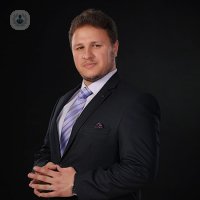Why is it important to treat my venous issues?
Written by:Varicose veins are a common condition in the UK. Even though they are generally visible on the skin surface, varicose veins can also be invisible at first if they connect to the deeper vein system of the body.
Here to provide an expert insight into varicose veins, including symptoms and diagnosis, is Dr Omar Abu-Bakr, highly skilled consultant venous surgeon and phlebologist.

Briefly speaking, in veins, blood flows from tissues back to the heart. Thus, in legs, blood flow should be from down upwards, from the legs back to the heart.
However, for this to occur, veins need to have two things:
- Healthy valves within the veins, to lead blood upwards and prevent it from flowing back downwards.
- Healthy blood muscle pumps in the legs, to pump blood upwards when walking and prevent blood from collecting in the vein (a condition called stasis).
If any of these two things are affected, this can cause blood to flow backwards and pool in the vein. This is what happens, for example, with varicose veins.
When existing, varicose veins (and venous reflex, in general) cause damage through mechanical and chemical trauma – mainly, on the tissues on the lower calves. The mechanical trauma is that caused by the blood flowing in the wrong direction and hitting the lower tissues, while the chemical trauma is that given from the stasis.
This trauma builds up in time, causing tissue damage at the calves’ level and increasing the risk of risk of ulcers and clots. Some patients might then start to feel symptoms at legs’ level, such as aching, pain, heaviness, itchiness, or cramps (mainly during the second half of the day), but other patients will never feel a thing. At this stage, patients have varicose veins (visible ones). If there are no symptoms, patients have hidden varicose veins or stage 2 A on the CEAP classification.
Considering this, patients should have a consultation for their veins:
- If they have symptoms, such as aching, pain, heaviness, itchiness and cramps that are usually worse in the second half of the day, even if they do not see any varicose veins.
- If they see varicose veins, even if they do not have any symptoms.
- If they have spider veins, even if they do not see varicose veins or they do not have any symptoms. A third to half of patients with spider veins have underlying varicose veins, even if they do not feel any symptoms.
- If they start to see skin changes at their calves’ level, such as eczema or brown stains, or, if they have a wound that is taking too long to heal at their calves’ level.
A vein consultation, of course, should include a thorough Doppler Ultrasound scan. The scan should be carried out properly, taking 40-60 minutes to complete (it should never be a 5–10-minute scan).
With that in hand, the specialist will have a clear image of a patient’s varicose veins, including: which veins are causing the issues; what is the relationship between the veins; and what is the connection between the veins and the other tissues. Based on this information, a treatment plan is then tailored specifically for each patient and for each leg - there is no golden treatment.
Overall, varicose veins, no matter how advanced or severe, are very easy to treat if things are done properly. Treatment is extremely efficient and extremely cosmetic; that is, a beautiful combination between art and science.
Dr Omar Abu-Bakr is a renowned consultant with more than 13 years of experience. If you are seeking state-of-the-art diagnosis and treatment for varicose veins, do not hesitate to visit Dr Abu-Bakr’s Top Doctors profile today.


